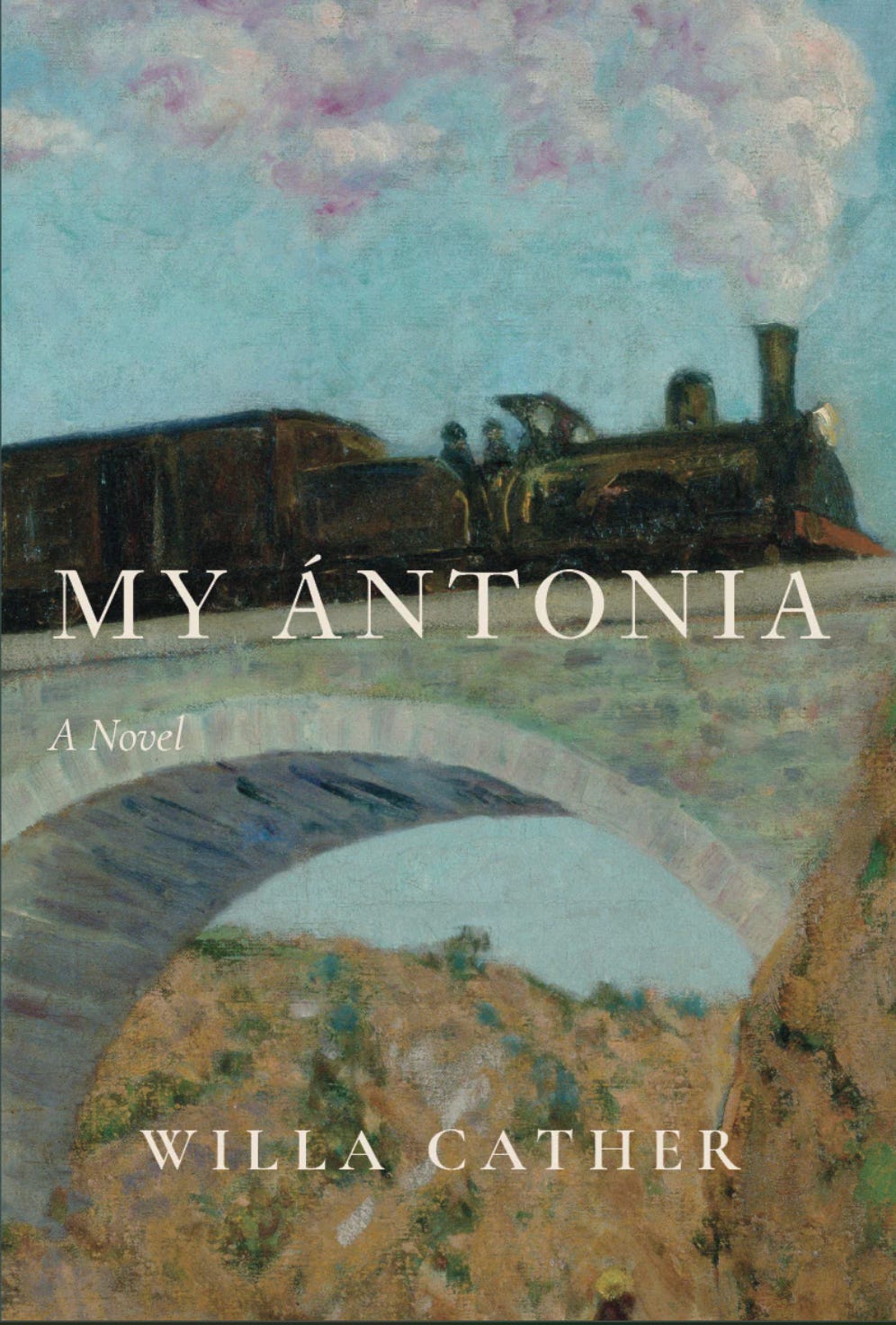Book Review: My Antonia by Willa Cather
A dose of steadfast Midwestern values...for those who might forget.
(Available through Cluny Media, $19.95)
Willa Cather is rightly remembered for her vivid descriptions, insightful observations and keen eye for detail. Readers familiar with the worlds she explored were never disappointed. My Antonia doesn’t relate the story of a different world, such as her acclaimed novel Death Comes for the Archbishop. It is an autobiographical ode to the Midwestern roots that she cherished.
Protagonist Jim Burden is Cather’s stand-in. She also was born in Virginia, and moved to the Nebraska prairie as a child. Unusual for her era, Cather also attended the University of Nebraska and later moved to New York City, just as Burden does in the novel. She landed a succession of jobs in the editing and publishing worlds, and taught Latin and English in several venues before achieving financial success as a novelist in 1910, with the publication of O Pioneers.
The novel begins with Burden, a middle-aged lawyer, reminiscing with a fellow transplant about the town of their youth, and their memories of Antonia. Despite the possessive title, he does not claim Antonia for his own. Rather, throughout the novel, Jim Burden’s memories impose their own mark on his shared history with Antonia, and in this way Cather highlights Antonia’s merits, unmasked by a sympathetic friend with a romantic view of his childhood home. Her hardships only made her more beautiful, at least to Jim.
Jim and Antonia were neighbors in the beginning. The young boy Jim was an orphan cared for by his grandparents, while Antonia’s Bohemian family struggled to adjust to American farming. Her father commits suicide, and his desperate heirs rely on Jim’s family, a fact that partially alienates Antonia from Jim, and colors the rest of their relationship. While she is out plowing in the fields, Jim’s life proceeds in a sheltered pattern.
Both move to town, Jim as a student and Antonia as a hired girl for a wealthy family. Their lives begin to diverge here. Cather weaves a bit of social commentary between the lines, as she highlights the life and energy of the immigrant woman with the Victorian belles who were pampered and showcased in novels by authors like Edith Wharton. Work ennobles the worker, and muscles masked ambition and intelligence.
Antonia’s friend, Lena Lingard, is also no stranger to work. The eldest of a large, Catholic family, Lena leaves her tired life at home and moves near the university in Lincoln, where she and Jim are friends during his tenure there, sometimes more, sometimes less. Contrasted with Antonia, Lena is the sexy, sophisticated urban woman. And yet, in Jim’s mind, she lacks some of the vital forcefulness that Antonia had to muster to survive.
Meanwhile, Antonia moves to Denver to marry, but ends up back at home, abandoned and pregnant. Devastated, and suffering her family’s disapproval, she keeps the baby and returns to help on her brother’s farm. Jim spends some time with her while home on vacation when the child is two, secretly depressed at her tragic story, and yet impressed at her perseverance.
Twenty years pass before he visits her again, at the suggestion of Lena. Married and now the mother of a huge brood of children, Jim finds in her joyful home a wonderful gestalt of the rich soil of his youth.
“She was a battered woman now, not a lovely girl; but she still had that something which fires the imagination, could still stop one’s breath for a moment by a look or gesture that somehow revealed the meaning in common things… All the strong things of her heart came out in her body, that had been so tireless in serving generous emotions. It was no wonder that her sons stood tall and straight. She was a rich mine of life, like the founders of early races.”
Cather’s My Antonia is a tribute to the women who worked even harder than she ever did for the bare necessities of life, and thus stood even taller for the successes they could claim. Cather hoped to stand with them when her work was done. A quote from My Antonia is on Cather’s tombstone “that is happiness– to be dissolved into something complete and great.”
Discussion Questions:
Is this novel a pious fable? Does hard work and tragedy ennoble the human soul?Have you ever met a woman in real life who reminds you of Antonia? Tell about that person.
Cather walks back into her own past to discover a story that revealed her ideals and the centering experience of being at home. If you were to walk back into your past, what persons or places (or both) would you highlight to show your values, and why?





